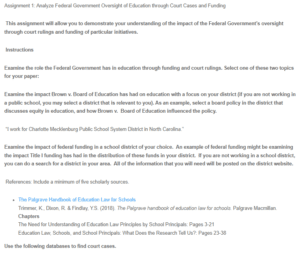Discussion – Federal Funding
The government’s involvement in education includes implementing laws and programs to benefit learners. According to Trimmer et al. (2018), the activities and dealings of principals in schools are affected by varied, diverse, and constantly evolving influences within the school’s internal and external environments. One of the influences is federal funding. The Elementary and Secondary Education Act introduced federal funding in the United States to reduce the gaps in funding for low-income learners (Gartner, 2023). The funding program, known as Title I program, includes using a formula that enhances equity in schools because the federal financing programs aim to create a limited level of equalization of resources and spending and the local ability to raise funds for public secondary and elementary schools. However, districts in areas with high poverty levels receive less funding, leading to inequity. Allegretto (2022) argues that school districts, especially the ones in areas dominated by low-income earners, are unable to spend enough to meet the state average test scores used in assessing adequacy. Therefore, most schools, especially in low-income areas, use federal funding to meet costs such as paying teachers instead of students’ tuition fees.
Charlotte Mecklenburg Public School System District in North Carolina has benefited from federal funding for the past five years. The school has benefited from the Title I funding formula because it promotes equity in the distribution of funds in the district, allowing the schools to meet learners’ needs. The funds are managed by the Charlotte-Mecklenburg Schools (CMS) Federal Programs Department, which has enabled the district to use the funds to improve the academic achievement of disadvantaged learners (Charlotte-Mecklenburg Schools, 2024). The Title I program has also created a source of funds to pay guest teachers so that there are enough teachers to teach the students in each class. According to Morrison (2023), the guest teacher program is funded by approximately $22 million from the funds provided by the government during the COVID-19 pandemic to support schools. Therefore, federal funding guarantees the continuity of learning at Charlotte-Mecklenburg Schools System District and promotes equality in education by providing learning opportunities for disadvantaged learners.
References
Allegretto, R. • B. S. (2022). Public education funding in the U.S. needs an overhaul: How a larger federal role would boost equity and shield children from disinvestment during downturns. Economic Policy Institute. https://www.epi.org/publication/public-education-funding-in-the-us-needs-an-overhaul/
Charlotte-Mecklenburg Schools. (2024). Federal Programs / Federal Programs. https://www.cmsk12.org/domain/5845
Gartner*, D. (2023, April 10). The federal role in school funding equity. Virginia Law Review -. https://virginialawreview.org/articles/the-federal-role-in-school-funding-equity/
Morrison, S. (2023). CMS losing successful program due to funding shortfall | wcnc.com. WCNC Charlotte. https://www.wcnc.com/article/news/education/charlotte-schools-funding-gap-north-carolina/275-a2d31d0e-3e06-4c42-85c8-022f0019ed8a
Trimmer, K., Dixon, R., & Findlay, Y. S. (2018). The Palgrave Handbook of Education Law for Schools. Palgrave Macmillan, Springer International Publishing AG.
ORDER A PLAGIARISM-FREE PAPER HERE
We’ll write everything from scratch
Question
Assignment 1: Analyze Federal Government Oversight of Education through Court Cases and Funding
This assignment will allow you to demonstrate your understanding of the impact of the Federal Government’s oversight through court rulings and funding of particular initiatives.

Discussion – Federal Funding
Instructions
Examine the role the Federal Government has in education through funding and court rulings. Select one of these two topics for your paper:
Examine the impact Brown v. Board of Education has had on education with a focus on your district (if you are not working in a public school, you may select a district that is relevant to you). As an example, select a board policy in the district that discusses equity in education, and how Brown v. Board of Education influenced the policy.
“I work for Charlotte Mecklenburg Public School System District in North Carolina.”
Examine the impact of federal funding in a school district of your choice. An example of federal funding might be examining the impact Title I funding has had in the distribution of these funds in your district. If you are not working in a school district, you can do a search for a district in your area. All of the information that you will need will be posted on the district website.
References: Include a minimum of five scholarly sources.
- The Palgrave Handbook of Education Law for Schools
Trimmer, K., Dixon, R. & Findlay, Y.S. (2018). The Palgrave handbook of education law for schools. Palgrave Macmillan.
Chapters
The Need for Understanding of Education Law Principles by School Principals: Pages 3-21
Education Law, Schools, and School Principals: What Does the Research Tell Us?: Pages 23-38
Use the following databases to find court cases.

